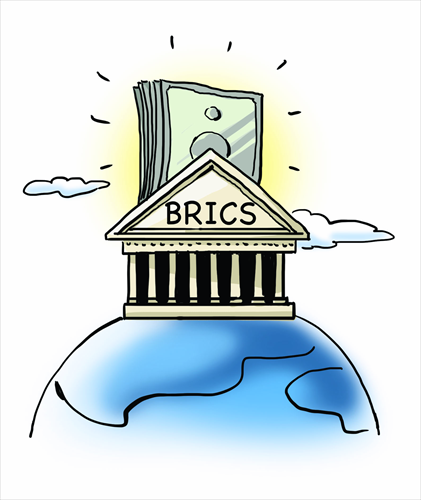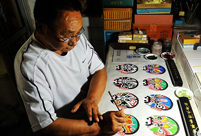 Happy life in Xinjiang
Happy life in Xinjiang
 2014 China Hainan Int'l Automotive Exhibition kicks off
2014 China Hainan Int'l Automotive Exhibition kicks off
 Collection of 'China Dream' public-spirited ads
Collection of 'China Dream' public-spirited ads
 The silent holy stones
The silent holy stones
 University students take care of giant pandas
University students take care of giant pandas
 Leading lady a true legend
Leading lady a true legend
 China Pan-Asia Stone Expo held in Kunming
China Pan-Asia Stone Expo held in Kunming
 Taiwan woman marries into Kazak family, 100 sheep plus a flat as dowry
Taiwan woman marries into Kazak family, 100 sheep plus a flat as dowry
 College girls take graduation photos under water in Chongqing
College girls take graduation photos under water in Chongqing
 Cartoon: Xi and football
Cartoon: Xi and football
 |
| Illustration: Liu Rui/GT |
Five years have passed since four heads of government from the BRIC countries convened in Yekaterinburg for the first summit. Soon after that meeting, many Western scholars openly expressed their pessimistic views toward the BRIC group, claiming that it wouldn't prevail due to large divergences among its member countries.
As the growth of new emerging economies has slowed down, a myriad of Western scholars and media outlets made gloomy predictions of the BRICS, while at the same time, strategists such as Zbigniew Brzezinski and Joseph Nye have kept a close eye on whether the BRICS countries could make an advance in such issues as setting up a BRICS-led development bank.
BRICS, in fact, has consolidated its status and clout as an international political and economic group. It is unleashing attractiveness to other new emerging economies which have been disposed toward joining the group.
The ongoing Fortaleza summit is a launch pad for two financial institutions: the New Development Bank (NDB) and the Contigent Reserve Arrangement (CRA). This will signify a substantial institutional step forward.
The goal of the NDB is to provide low-interest loans to the vast number of developing countries, including the BRICS economies, assisting them in infrastructure construction.
The bank, which will have an initial subscribed capital of $50 billion from the five member countries, will finally be built up to $100 billion in capital. Participation in the NDB will be on the basis of equal shares: $10 billion each and equal voting rights for each member.
Although the admission of new shareholders in the bank's capital is open, the BRICS will always retain a controlling stake of no less than 55 percent. All major decisions at the NDB are to be made through a majority or two-thirds vote.
The CRA, which will also be built up to $100 billion, is aimed at dealing with all emergencies during the time of a financial crisis.
China will be the largest donor to this reserve fund, bringing in $41 billion, followed by $18 billion each from Brazil, India and Russia and $5 billion from South Africa.
The establishment of the NDB and the CRA has been viewed as a counterweight to the Western-dominated financial organizations, namely the World Bank and the International Monetary Fund (IMF). Such a point of view is based on the doctrine of Western superiority.
The outbreak of the 2008 financial crisis illuminates the flaw of the prevailing international financial system and the necessity to reform. Since the US dollar's dominant position in global reserves is very robust, the developing nations, including new emerging powers, suffered the strongest impact during the crisis, no matter when Washington implemented or withdrew the policy of quantitative easing.
Given the fact that international financial reforms are hard to advance, the BRICS countries have to blaze a new trail to reduce losses as well as safeguard interests.
The NDB and the CRA in actuality supplement the existing global financial system.
Loans from the World Bank are not able to meet the demands of the developing nations, and the funding on infrastructure which is direly needed by developing countries only takes a small slice of the Word Bank. The IMF also failed to play an active role in stabilizing the turbulent emerging financial markets during the global financial crisis.
With a different shareholding structure and operation model from the World Bank and the IMF, the BRICS-led development bank and the reserve fund better embody democracy, which will attract more countries to join in, thus injecting an element of healthy competition among financial institutions.
Consequently, competition could stimulate the World Bank and the IMF to promote reforms on shareholding and operation.
Western countries have been asking new emerging countries, including China, to take more international responsibilities. The biggest problem facing the international community is development.
New emerging economies, the BRICS countries in particular, are actually meeting Western demands by establishing the NDB and the CRA to finance development of developing nations and stabilize the global financial market.
 Moms on their kid’s coming out
Moms on their kid’s coming out Chinese fighters through lens
Chinese fighters through lens
 Children attend gymnastics training in summer
Children attend gymnastics training in summer
 Beautiful sceneries along the special travel route in Xinjiang
Beautiful sceneries along the special travel route in Xinjiang
 Beauty SWAT member in Xinjiang sparks online frenzy
Beauty SWAT member in Xinjiang sparks online frenzy
 Germany beat Argentina 1-0 to win World Cup
Germany beat Argentina 1-0 to win World Cup
 National fitness team members integrate traditional and modern beauty
National fitness team members integrate traditional and modern beauty Collection of 'China Dream' public-spirited ads
Collection of 'China Dream' public-spirited ads  How Chinese men kill the time when their wives practice square dancing?
How Chinese men kill the time when their wives practice square dancing? China's largest 3D printer builds 2-meter-long boat
China's largest 3D printer builds 2-meter-long boat
 One-legged women with high heel goes viral on Internet
One-legged women with high heel goes viral on Internet Photos of the Week
(July 6 - July 12)
Photos of the Week
(July 6 - July 12)
 'Super moon' seen in Beijing
'Super moon' seen in Beijing
 Happy life in Xinjiang
Happy life in Xinjiang
 'Finding Nemo' in Seattle Aquarium
'Finding Nemo' in Seattle AquariumDay|Week|Month